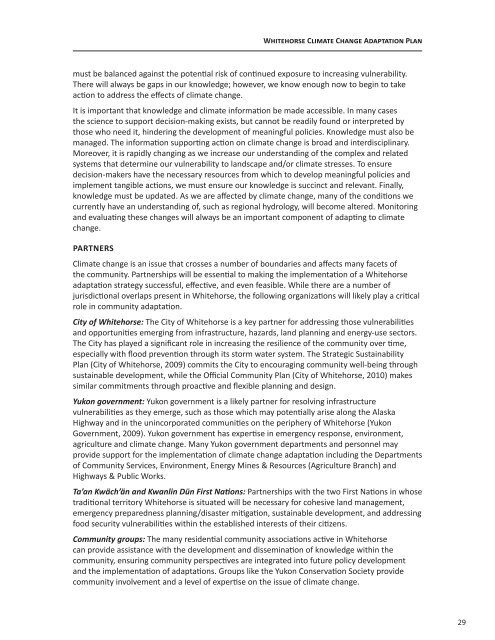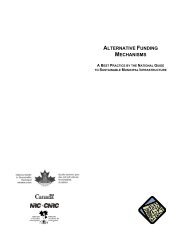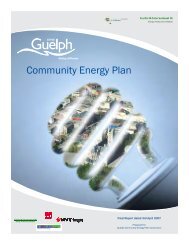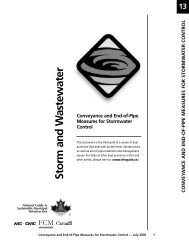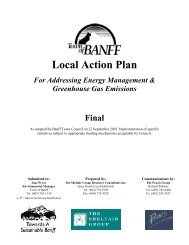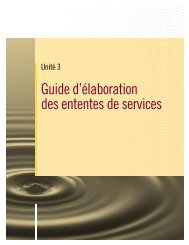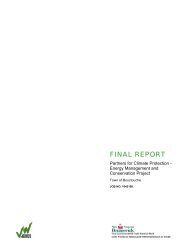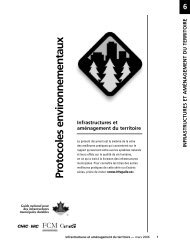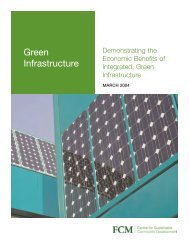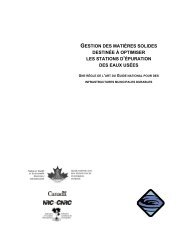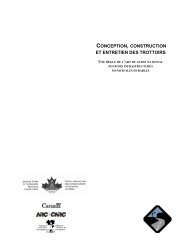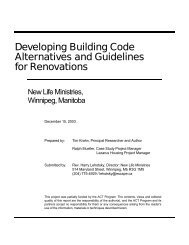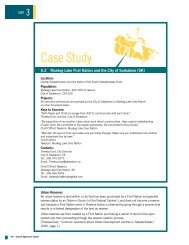Whitehorse Climate Change Adaptation Plan - Yukon College
Whitehorse Climate Change Adaptation Plan - Yukon College
Whitehorse Climate Change Adaptation Plan - Yukon College
Create successful ePaper yourself
Turn your PDF publications into a flip-book with our unique Google optimized e-Paper software.
must be balanced against the potential risk of continued exposure to increasing vulnerability.<br />
There will always be gaps in our knowledge; however, we know enough now to begin to take<br />
action to address the effects of climate change.<br />
It is important that knowledge and climate information be made accessible. In many cases<br />
the science to support decision-making exists, but cannot be readily found or interpreted by<br />
those who need it, hindering the development of meaningful policies. Knowledge must also be<br />
managed. The information supporting action on climate change is broad and interdisciplinary.<br />
Moreover, it is rapidly changing as we increase our understanding of the complex and related<br />
systems that determine our vulnerability to landscape and/or climate stresses. To ensure<br />
decision-makers have the necessary resources from which to develop meaningful policies and<br />
implement tangible actions, we must ensure our knowledge is succinct and relevant. Finally,<br />
knowledge must be updated. As we are affected by climate change, many of the conditions we<br />
currently have an understanding of, such as regional hydrology, will become altered. Monitoring<br />
and evaluating these changes will always be an important component of adapting to climate<br />
change.<br />
PARTNERS<br />
<strong>Whitehorse</strong> <strong>Climate</strong> <strong>Change</strong> <strong>Adaptation</strong> <strong>Plan</strong><br />
<strong>Climate</strong> change is an issue that crosses a number of boundaries and affects many facets of<br />
the community. Partnerships will be essential to making the implementation of a <strong>Whitehorse</strong><br />
adaptation strategy successful, effective, and even feasible. While there are a number of<br />
jurisdictional overlaps present in <strong>Whitehorse</strong>, the following organizations will likely play a critical<br />
role in community adaptation.<br />
City of <strong>Whitehorse</strong>: The City of <strong>Whitehorse</strong> is a key partner for addressing those vulnerabilities<br />
and opportunities emerging from infrastructure, hazards, land planning and energy-use sectors.<br />
The City has played a significant role in increasing the resilience of the community over time,<br />
especially with flood prevention through its storm water system. The Strategic Sustainability<br />
<strong>Plan</strong> (City of <strong>Whitehorse</strong>, 2009) commits the City to encouraging community well-being through<br />
sustainable development, while the Official Community <strong>Plan</strong> (City of <strong>Whitehorse</strong>, 2010) makes<br />
similar commitments through proactive and flexible planning and design.<br />
<strong>Yukon</strong> government: <strong>Yukon</strong> government is a likely partner for resolving infrastructure<br />
vulnerabilities as they emerge, such as those which may potentially arise along the Alaska<br />
Highway and in the unincorporated communities on the periphery of <strong>Whitehorse</strong> (<strong>Yukon</strong><br />
Government, 2009). <strong>Yukon</strong> government has expertise in emergency response, environment,<br />
agriculture and climate change. Many <strong>Yukon</strong> government departments and personnel may<br />
provide support for the implementation of climate change adaptation including the Departments<br />
of Community Services, Environment, Energy Mines & Resources (Agriculture Branch) and<br />
Highways & Public Works.<br />
Ta’an Kwäch’än and Kwanlin Dün First Nations: Partnerships with the two First Nations in whose<br />
traditional territory <strong>Whitehorse</strong> is situated will be necessary for cohesive land management,<br />
emergency preparedness planning/disaster mitigation, sustainable development, and addressing<br />
food security vulnerabilities within the established interests of their citizens.<br />
Community groups: The many residential community associations active in <strong>Whitehorse</strong><br />
can provide assistance with the development and dissemination of knowledge within the<br />
community, ensuring community perspectives are integrated into future policy development<br />
and the implementation of adaptations. Groups like the <strong>Yukon</strong> Conservation Society provide<br />
community involvement and a level of expertise on the issue of climate change.<br />
29


